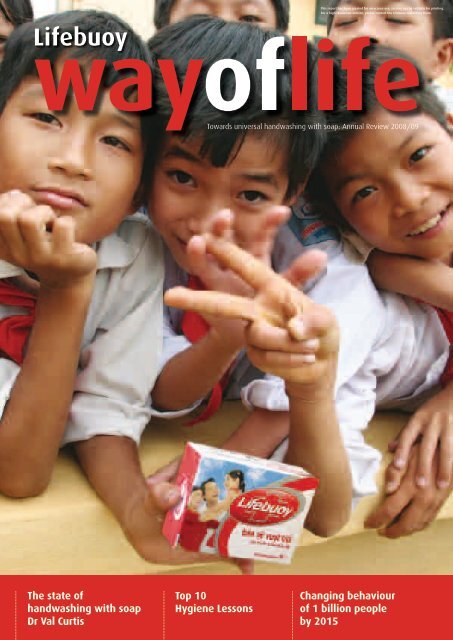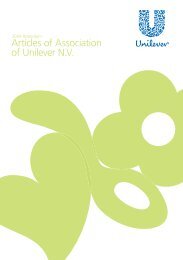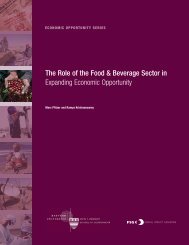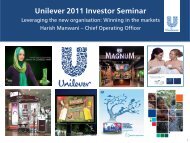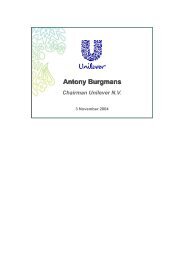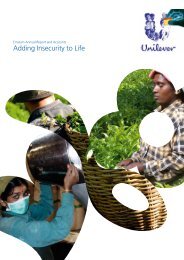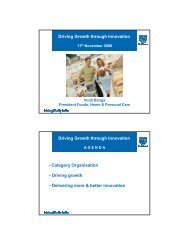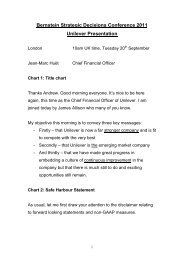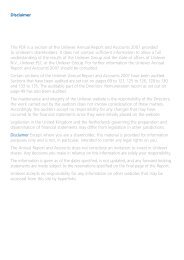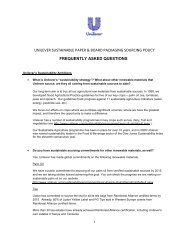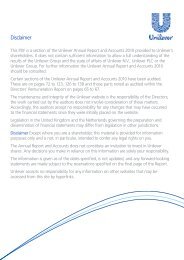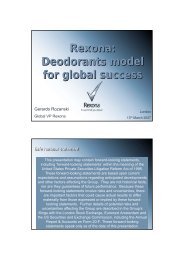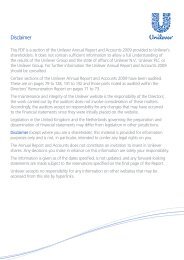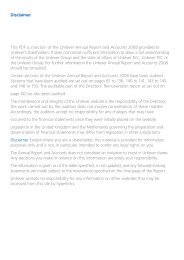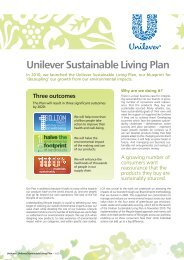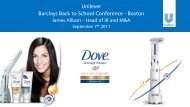Lifebuoy Way of life - Unilever
Lifebuoy Way of life - Unilever
Lifebuoy Way of life - Unilever
You also want an ePaper? Increase the reach of your titles
YUMPU automatically turns print PDFs into web optimized ePapers that Google loves.
The state <strong>of</strong><br />
handwashing with soap<br />
Dr Val Curtis<br />
Top 10<br />
Hygiene Lessons<br />
This report has been created for on-screen use, so may not be suitable for printing.<br />
For a high resolution version, please contact the <strong>Lifebuoy</strong> marketing team.<br />
Towards universal handwashing with soap: Annual Review 2008/09<br />
Changing behaviour<br />
<strong>of</strong> 1 billion people<br />
by 2015
<strong>Lifebuoy</strong> way <strong>of</strong> <strong>life</strong><br />
02<br />
LIFEBUOY’S<br />
ON A MISSION<br />
Annual Review 2008 - 2009<br />
{<strong>Lifebuoy</strong> aims to bring safety, security<br />
and health to five billion people around<br />
the world, through the active promotion<br />
<strong>of</strong> handwashing with soap.<br />
03
<strong>Lifebuoy</strong> way <strong>of</strong> <strong>life</strong><br />
Contents<br />
04<br />
6<br />
8<br />
10<br />
12<br />
14<br />
16<br />
20<br />
24<br />
28<br />
30<br />
32<br />
33<br />
Foreword<br />
- Opening statements from Paul Polman, <strong>Unilever</strong> CEO,<br />
and Ricardo Pimenta, Global Brand VP <strong>Unilever</strong> Health Brands<br />
Our commitment to making a difference every day<br />
- Myriam Sidibe, <strong>Lifebuoy</strong> Global Social Mission Manager,<br />
introduces the <strong>Lifebuoy</strong> Social Mission<br />
<strong>Lifebuoy</strong> - in brief<br />
- Some facts about the brand<br />
Handwashing state <strong>of</strong> the world<br />
- A summary from Dr Val Curtis, Director <strong>of</strong> the Hygiene Centre at the<br />
London School <strong>of</strong> Hygiene & Tropical Medicine<br />
A brand on a mission<br />
- Making a difference around the world<br />
Hygiene promotion activations<br />
- Putting a spotlight on <strong>Lifebuoy</strong> country programmes<br />
Capacity building and partnerships<br />
- How teamwork is shaping the future for handwashing<br />
Advocacy<br />
- Keeping handwashing on the global and local agendas<br />
<strong>Lifebuoy</strong> <strong>Way</strong> <strong>of</strong> Life<br />
- Tracking social and business impacts<br />
Rewind and Recap<br />
- The <strong>Lifebuoy</strong> Top 10 hygiene and health lessons<br />
learned from 2008-2009<br />
Our next steps<br />
- Anuj Rustagi, <strong>Lifebuoy</strong> Global Brand Director,<br />
outlines the <strong>Lifebuoy</strong> <strong>Way</strong> <strong>of</strong> Life Challenge<br />
References<br />
Annual Review 2008 - 2009<br />
05
<strong>Lifebuoy</strong> way <strong>of</strong> <strong>life</strong><br />
POSITIVE<br />
06<br />
Foreword<br />
“I sincerely believe that businesses like<br />
<strong>Unilever</strong> can be a positive force for good<br />
in the world and that such an approach is<br />
in the interests <strong>of</strong> all our stakeholders – our<br />
investors, our consumers, our employees<br />
and the communities where we operate.”<br />
{<br />
<strong>Unilever</strong>’s mission is to meet the<br />
everyday needs <strong>of</strong> people around<br />
the world for nutrition, hygiene<br />
and personal care. We do this with<br />
products that help people feel good,<br />
look good and get more out <strong>of</strong> <strong>life</strong> –<br />
something which <strong>Lifebuoy</strong> has been<br />
doing for the past 114 years.<br />
Every day around 160 million people<br />
in 150 countries choose our <strong>Unilever</strong><br />
brands to feed their families and to<br />
clean themselves and their homes.<br />
And every second, 91 families<br />
choose a <strong>Lifebuoy</strong> product to deliver<br />
on health and hygiene promises.<br />
Unsurprisingly, therefore, the social<br />
and environmental impacts we have<br />
on the world come largely from our<br />
brands, and <strong>Lifebuoy</strong> is at the centre<br />
<strong>of</strong> the positive social impacts that<br />
<strong>Unilever</strong> as a corporation can deliver.<br />
This is why we are embedding<br />
sustainability thinking into the<br />
day-to-day activities <strong>of</strong> our brand<br />
management and R&D teams. The<br />
<strong>Lifebuoy</strong> brand has been at the<br />
forefront <strong>of</strong> the piloting <strong>of</strong> tools such<br />
as Brand Imprint and social metrics.<br />
Both these tools are helping us think<br />
more carefully about the resources<br />
Foreword from Ricardo Pimenta,<br />
Global Brand Vice President,<br />
<strong>Unilever</strong> Health Brands<br />
we use, such as water, packaging,<br />
energy and raw materials, and the<br />
social and economic impacts <strong>of</strong> our<br />
brands in the countries where they<br />
are sold.<br />
Ever since the launch <strong>of</strong> its first<br />
soap products over 100 years ago,<br />
<strong>Lifebuoy</strong> has helped make a positive<br />
difference to people’s health and<br />
well-being in the developed and<br />
developing world. But preventable<br />
diseases, resulting from poor hygiene<br />
and sanitation, still pose a significant<br />
health challenge. Every year more<br />
than 3.5 million children still die<br />
before the age <strong>of</strong> five because <strong>of</strong><br />
diarrhoea and acute respiratory<br />
infections. Encouraging people to<br />
change their habits – by washing<br />
hands with soap before touching<br />
food and after going to the toilet – is<br />
essential, and central to all <strong>Lifebuoy</strong><br />
brand activities.<br />
What makes doing good sustainable<br />
in the long run is the business<br />
benefits that <strong>Lifebuoy</strong> delivers year<br />
after year. It is one <strong>of</strong> the fastestgrowing<br />
brands in our skin care<br />
business, recording double digit<br />
Annual Review 2008 - 2009<br />
{<br />
Paul Polman,<br />
<strong>Unilever</strong> Chief<br />
Executive<br />
Officer<br />
growth every year in recent years,<br />
demonstrating its ability to <strong>of</strong>fer an<br />
invaluable response to the demands<br />
<strong>of</strong> consumers in developing and<br />
emerging markets.<br />
This first <strong>Lifebuoy</strong> Social Mission<br />
Annual Review is evidence <strong>of</strong><br />
how seriously <strong>Lifebuoy</strong> takes its<br />
commitments. The report provides<br />
a review <strong>of</strong> our latest activities to<br />
support the <strong>Lifebuoy</strong> social mission –<br />
a mission that is absolutely integral<br />
to the brand.<br />
07
<strong>Lifebuoy</strong> way <strong>of</strong> <strong>life</strong><br />
08<br />
Our commitment to<br />
making a difference<br />
every day<br />
By Dr Myriam Sidibe DrPH, <strong>Lifebuoy</strong> Global Social Mission Manager<br />
THE LIFEBUOY BRAND’S SOCIAL MISSION IS TO BRING SAFETY, SECURITY<br />
AND HEALTH TO FIVE BILLION PEOPLE THROUGH THE ACTIVE PROMOTION<br />
OF HANDWASHING WITH SOAP. AND WHILE OUR PRODUCTS ALREADY<br />
PROVIDE MILLIONS OF PEOPLE WITH ACCESSIBLE AND AFFORDABLE<br />
HYGIENE, AS THE WORLD’S LEADING HEALTH SOAP, WE KNOW THERE IS<br />
MORE THE BRAND CAN DO.<br />
Through the <strong>Lifebuoy</strong> brand’s social mission<br />
programmes we aim to make a difference in<br />
people’s day-to-day lives – spreading positive<br />
hygiene messages through hygiene promotion<br />
activities. The projects instigated by our country<br />
teams are already making a difference and<br />
helping to save lives. The resources we provide<br />
to complement those supplied by the public<br />
sector are vital to ensure that we continue<br />
reaching people who need our help the most.<br />
Our commitment to the <strong>Lifebuoy</strong> social mission<br />
is evident in the steps we have taken towards<br />
making handwashing with soap central to the<br />
brand’s marketing efforts.<br />
This report gives an overview <strong>of</strong> the work<br />
<strong>Lifebuoy</strong> has done in 2008 and 2009, partnering<br />
<strong>Lifebuoy</strong> together with public and private sector<br />
partners around the world, who share the brand’s<br />
commitment to promoting health and hygiene.<br />
Without these important partnerships it would not<br />
be possible to share our messages on such a<br />
large scale.<br />
Before joining the <strong>Lifebuoy</strong> team, I worked for<br />
non-governmental organisations and in the<br />
public sector, and have lived in more than 20<br />
countries around the world. I sought a platform<br />
from which I could make a real impact to people’s<br />
lives. I believe that <strong>Lifebuoy</strong> and <strong>Unilever</strong> as a<br />
corporation <strong>of</strong>fers this platform, with clear, tangible<br />
deliverables that are relevant both for business<br />
and social benefits. Visiting some <strong>of</strong> the <strong>Lifebuoy</strong><br />
brand’s social mission programmes in India,<br />
Indonesia and Vietnam has made me realise that<br />
we have already achieved so much, thanks to the<br />
right support and gives me the confidence that we<br />
can achieve a lot more. The commitment <strong>of</strong> our<br />
<strong>Lifebuoy</strong> teams across the world is exceptional<br />
and unique.<br />
I AM CONFIDENT THAT THE LIFEBUOY TEAMS, TOGETHER WITH<br />
OUR PARTNERS, CAN CONTINUE TO BUILD ON OUR WORK IN<br />
THE FUTURE, TO MAKE A LASTING IMPACT ON PUBLIC HEALTH<br />
AROUND THE WORLD.<br />
Key:<br />
Countries where <strong>Lifebuoy</strong> was sold in 2009<br />
Annual Review 2008 - 2009<br />
09
<strong>Lifebuoy</strong> way <strong>of</strong> <strong>life</strong><br />
10<br />
LIFEBUOY -<br />
• LAUNCHED IN THE UK IN 1894, <strong>Lifebuoy</strong> is one <strong>of</strong> <strong>Unilever</strong>’s oldest<br />
brands, and has championed a message <strong>of</strong> health through hygiene for<br />
more than a century<br />
• One <strong>of</strong> <strong>Unilever</strong>’s founders, William Lever, launched the <strong>Lifebuoy</strong> brand<br />
to help bring affordable hygiene to Victorian England at a time when<br />
epidemics <strong>of</strong> typhoid, smallpox, cholera and diphtheria were a<br />
constant threat.<br />
• Today <strong>Lifebuoy</strong> products are sold in more than 34 countries in Asia and<br />
Africa, and every second 91 families buy a <strong>Lifebuoy</strong> product, trusting<br />
the <strong>Lifebuoy</strong> brand for their family’s health.<br />
• <strong>Lifebuoy</strong> was the world’s first health soap when it was launched in 1894,<br />
and it is still the world’s no.1 selling germ protection soap today*.<br />
• The <strong>Lifebuoy</strong> Clinical Trial in 2007/8 demonstrated that by following<br />
the <strong>Lifebuoy</strong> <strong>Way</strong> (washing hands at 5 key occasions during the day),<br />
episodes <strong>of</strong> diarrhoea in target children reduced by 25% and target<br />
children had 40% less days <strong>of</strong>f school due to illness, compared with the<br />
control group.<br />
• <strong>Lifebuoy</strong> branded hygiene promotion activations, such as Swasthya<br />
Chetna in India, Berbagi Sehat in Indonesia and Germ Fighters in Sri<br />
Lanka have educated over 125 million people about the importance <strong>of</strong><br />
handwashing with soap.<br />
Annual Review 2008 - 2009<br />
* ACNielsen Scantrack and Retail Index Skin Cleansing Brand Volume Sales 12 months to August 2009<br />
11
<strong>Lifebuoy</strong> way <strong>of</strong> <strong>life</strong><br />
Handwashing<br />
state <strong>of</strong> the World<br />
THE GRAPH ON THE RIGHT TELLS<br />
A VERY SHORT LIFE STORY. IT<br />
BEGINS WITH LAXMI’S BIRTH, IN<br />
A VILLAGE IN RURAL ANDHRA<br />
PRADESH ON THE SOUTH-EASTERN<br />
COAST OF INDIA. A HAPPY CHILD,<br />
LAXMI GROWS WELL UNTIL HER<br />
FIFTH MONTH WHEN SHE FALLS<br />
ILL WITH DIARRHOEA AND A BAD<br />
COUGH. SHE RECOVERS BUT AT NINE<br />
MONTHS CATCHES A RESPIRATORY<br />
INFECTION THAT TURNS INTO<br />
PNEUMONIA.<br />
Though it takes her family a while to gather together<br />
the money for medicine, she is eventually cured. But<br />
because <strong>of</strong> repeated diarrhoea and respiratory illnesses,<br />
Laxmi is malnourished, leaving her vulnerable to<br />
infections.<br />
BY THE AGE OF THREE SHE IS SO WEAK<br />
AFTER SUFFERING FROM MEASLES THAT<br />
AN INFECTION THAT IS NEVER EVEN<br />
DIAGNOSED CAUSES HER DEATH.<br />
Laxmi’s is not an unusual story. Every year in developing<br />
countries more than 10 million children die before their<br />
fifth birthday 1 . But there is some good news. Child<br />
survival has been improving in recent decades due to<br />
better health care, continued economic development,<br />
improved products and environments, and new cultural<br />
expectations.<br />
However, there’s still a long way to go. While most<br />
people in emerging markets do have soap at home,<br />
more than 80% fail to use it for washing their hands. As<br />
a result, children face an onslaught <strong>of</strong> pathogens every<br />
day in their own homes.<br />
HANDWASHING HELPS:<br />
THE LATEST FINDINGS<br />
It is a well known fact that effective handwashing can<br />
prevent diarrhoeal diseases. Handwashing with soap is<br />
12<br />
A report from Dr Val Curtis, Director <strong>of</strong> the Hygiene Centre at the<br />
London School <strong>of</strong> Hygiene & Tropical Medicine<br />
thought to reduce diarrhoea risk by up to 50% 2-4 . And in<br />
the last few years we have learned that handwashing<br />
can do even more. It protects from respiratory infection,<br />
reducing risk by an estimated 23% 5 and a study in<br />
Pakistan saw handwashing halve the risk <strong>of</strong> pneumonia<br />
infections 6 . It protects against pandemic flu 7 , SARS 8 ,<br />
trachoma 9 , and parasitic worm infections 10 . It keeps<br />
children in school 11 and it can reduce the deaths <strong>of</strong><br />
newborn babies, according to a recent study from<br />
Nepal 12 . Research has shown AIDS patients also have<br />
significantly less diarrhoea when they wash their hands<br />
regularly 13 , and a new study published this year in<br />
the Lancet suggests that poor hygiene may be one <strong>of</strong><br />
the reasons for chronic and intractable malnutrition in<br />
developing countries 14 .<br />
A recent review by the World Bank suggests promoting<br />
handwashing with soap may also be the single<br />
cheapest health intervention there is, coming above<br />
malaria and HIV control in terms <strong>of</strong> health benefits<br />
against expenditure 15 .<br />
Yet, even in developed countries with taps and towels,<br />
handwashing isn’t the rule. We monitored a motorway<br />
service station in the UK and found that <strong>of</strong> the 330,000+<br />
people who used the toilets only 32% <strong>of</strong> men and 64%<br />
<strong>of</strong> women washed their hands with soap. There is a<br />
long way to go until handwashing with soap becomes a<br />
universal habit.<br />
AVERAGE CHILD DEVELOPMENT<br />
LAXMI’S DEVELOPMENT<br />
CHANGING BEHAVIOUR<br />
Handwashing behaviour is learned early in <strong>life</strong>, is highly<br />
habitual, and is influenced by local cultural norms 16 – so<br />
by what everyone else is doing. Given the difficulty <strong>of</strong><br />
shifting established habits, we’ve found that we need<br />
to use shock tactics to make an impact.<br />
One approach that has been shown to work is to<br />
disgust people, making them aware that there<br />
is something nasty on their hands, by using a<br />
demonstration kit or through advertising 17-19 . Since<br />
people copy what others do it’s important to promote<br />
the idea that everybody is doing it 20 . Public pledges to<br />
handwash are likely to work, as are visible badges on<br />
young people or on houses or public walls.<br />
WHO’S FIGHTING FOR HANDWASHING?<br />
After many years working to raise the pr<strong>of</strong>ile <strong>of</strong><br />
handwashing, it’s finally getting global recognition. Key<br />
initiatives include the following:<br />
• The Global Public Private Partnership for Handwashing<br />
with Soap shows people around the world that<br />
handwashing with soap is important and that it can<br />
be promoted in exciting new ways. It has also helped<br />
establish Global Handwashing Day, which has had a<br />
huge impact worldwide<br />
• The Clean Care is Safe Care programme has been<br />
rolled out by the World Health Organisation to<br />
encourage handwashing in health care facilities<br />
around the world, achieving recognition despite<br />
modest levels <strong>of</strong> funding<br />
• International programmes to promote hygiene in<br />
schools are also ongoing, many supported by UNICEF.<br />
These can have a major impact on young people’s<br />
behaviour, but we still need to do more work to find<br />
out which approaches work best with children<br />
• Agencies that promote safe water and sanitation<br />
including UNICEF, the UK Department for<br />
International Development, WaterAid, Oxfam and<br />
non-governmental organisations all over the world<br />
generally agree that the promotion <strong>of</strong> hygiene is an<br />
essential adjunct to their work. However, it is hard<br />
to run effective behaviour-change programmes,<br />
especially when hygiene is always under-resourced.<br />
• Governments worldwide are taking up the<br />
handwashing message, mostly in response to<br />
pandemics such as SARS, bird flu and swine flu. They<br />
still have to learn that handwashing is for <strong>life</strong>, not just<br />
for emergencies.<br />
SO WHAT CAN WE DO?<br />
The private sector has a key role to play in handwashing. Soap marketers,<br />
such as those working on <strong>Lifebuoy</strong>, know what changes behaviour and<br />
understand how to design and deliver campaigns that reach vast and<br />
diverse populations. Marketers are masters at consumer insight, at creative<br />
design and at the rollout and management <strong>of</strong> big campaigns 21 . Those <strong>of</strong><br />
us working in the health sector are depending on soap companies to work<br />
with us to help deliver handwashing to the millions that need it.<br />
HANDWASHING CAN HELP PREVENT:<br />
Diarrhoea<br />
Pneumonia<br />
Swine flu<br />
SARS<br />
Trachoma<br />
Worm infection<br />
Neonatal mortality<br />
School absenteeism<br />
Annual Review 2008 - 2009<br />
Sickness in AIDS Patients<br />
Chronic malnutrition<br />
13
<strong>Lifebuoy</strong> way <strong>of</strong> <strong>life</strong><br />
14<br />
A brand<br />
on a mission<br />
THROUGH LIFEBUOY, WE AIM TO MAKE A DIFFERENCE IN PEOPLE’S<br />
DAY-TO-DAY LIVES. WORKING WITH PUBLIC AND PRIVATE<br />
SECTOR PARTNERS AROUND THE WORLD, OUR CHALLENGE IS TO<br />
TRANSFORM HANDWASHING WITH SOAP FROM AN ABSTRACT<br />
GOOD IDEA INTO AN AUTOMATIC BEHAVIOURAL PATTERN AT<br />
CRITICAL TIMES OF THE DAY.<br />
OUR SOCIAL MISSION ACTIVITIES<br />
ARE BUILT UPON THE FOLLOWING<br />
THREE BELIEFS:<br />
• THE WORLD HAS MOVED ON FROM<br />
PHILANTHROPY.<br />
We realise donations alone cannot not provide the<br />
sustained, continuous programme <strong>of</strong> support that the<br />
world’s most intractable problems – such as improving<br />
health and hygiene – normally require<br />
• WE BELIEVE THAT BRANDS CAN BE A<br />
POSITIVE FORCE FOR GOOD.<br />
This is deep-rooted in the <strong>Lifebuoy</strong> brand history and<br />
<strong>Unilever</strong>’s ongoing commitment to social responsibility.<br />
We seek to invest in changing behaviour sustainably<br />
• THE FUTURE LIES WITH PUBLIC AND<br />
PRIVATE SECTOR PARTNERSHIPS.<br />
The private sector is best placed to provide expertise<br />
on marketing behaviour-change to large audiences,<br />
working with non-governmental organisations<br />
and governments to help achieve the Millennium<br />
Development Goals. These goals are a set <strong>of</strong><br />
internationally-agreed targets designed to alleviate<br />
poverty, hunger and ill-health around the world, and<br />
improve education, gender equality and environmental<br />
sustainability through global partnerships by 2015.<br />
THE LIFEBUOY<br />
SOCIAL MISSION<br />
ACTIVITIES INVOLVE<br />
SPREADING POSITIVE<br />
HYGIENE MESSAGES<br />
THROUGH EDUCATION.<br />
OUR ACTIVITIES<br />
FOCUS ON THREE<br />
CORE AREAS:<br />
1<br />
3<br />
HYGIENE PROMOTION<br />
ACTIVATIONS<br />
Around the world, <strong>Lifebuoy</strong> handwashing initiatives<br />
and hygiene promotion programmes reach people<br />
where they live, work and play – in villages, schools,<br />
shopping malls and hospitals.<br />
To ensure that our messages make a difference,<br />
we find ways to engage communities, ensuring<br />
that consumers understand the important role that<br />
handwashing with soap plays in keeping people safe<br />
and healthy. Central to this is the need for our target<br />
audience to experience effective handwashing to<br />
instil good habits.<br />
ADVOCACY<br />
2<br />
It is important to raise the pr<strong>of</strong>ile <strong>of</strong><br />
handwashing with soap, creating the right<br />
environment for investment in behaviour-<br />
change activities. <strong>Lifebuoy</strong> branded advocacy<br />
activities in 2008/2009 included addressing<br />
delegates at events such as the World Health<br />
Organisation Child Environmental Health<br />
conferences and the What If! Sustainable<br />
Development Conference. The brand also<br />
became a founding partner <strong>of</strong> Global<br />
Handwashing Day in October 2008.<br />
CAPACITY BUILDING<br />
AND PARTNERSHIPS<br />
>See page 16<br />
The <strong>Lifebuoy</strong> brand team partners public and private<br />
sector organisations around the world which share<br />
our commitment to promoting health and hygiene. By<br />
sharing our skills and experiences with our partners<br />
through activities and education campaigns, we can<br />
help build expertise in communicating the importance<br />
<strong>of</strong> handwashing with soap – a task which is too big<br />
for any single organisation to tackle alone.<br />
Annual Review 2008 - 2009<br />
>See page 22<br />
>See page 26<br />
15
<strong>Lifebuoy</strong> way <strong>of</strong> <strong>life</strong><br />
ENCOURAGING HANDWASHING BEHAVIOUR CHANGE IS CENTRAL TO<br />
ALL LIFEBUOY ACTIVATIONS. GENERALLY PEOPLE WASH THEIR HANDS<br />
SPORADICALLY WHEN THEY ARE ABOUT TO COME INTO CONTACT WITH<br />
FOOD OR AFTER USING THE TOILET. SOAP ONLY TENDS TO BE USED WHEN<br />
HANDS ARE VISIBLY DIRTY, SMELLY OR FEEL STICKY OR UNPLEASANT.<br />
By reviewing existing knowledge and<br />
insight, teams working on <strong>Lifebuoy</strong> have<br />
identified key behavioural issues which<br />
we address in our campaigns to drive<br />
sustainable handwashing behaviour change<br />
and which have helped us define the tools<br />
necessary to achieve such change.<br />
Featured in this report is a selection <strong>of</strong> case<br />
studies highlighting some <strong>of</strong> the hygiene<br />
promotion activations initiated by <strong>Lifebuoy</strong><br />
and supported by the brand’s advertising<br />
and promotion budget.<br />
LIFEBUOY HYGIENE PROMOTION ACTIVITIES ADHERE<br />
TO THE FOLLOWING GUIDING PRINCIPLES:<br />
• Activities educate through experience, demonstrating the importance <strong>of</strong><br />
handwashing with soap and how this should be done<br />
• <strong>Lifebuoy</strong> is a family ally. It’s a vitality brand, helping families to stay healthy and<br />
active for <strong>life</strong>, in line with <strong>Unilever</strong>’s global vitality mission<br />
• Activities should include parents and children together, to foster lasting good habits<br />
in handwashing.<br />
16<br />
1<br />
<strong>Lifebuoy</strong>’s<br />
hygiene<br />
promotion<br />
activations<br />
GLOW-GERM EXPERIENCE<br />
A SIMPLE, LOW-COST DEVICE IS HELPING<br />
LIFEBUOY DEMONSTRATE THE CLEANSING<br />
POWER OF SOAP TO COMMUNITIES<br />
ACROSS THE DEVELOPING WORLD. IN<br />
LINE WITH THE BRAND’S COMMITMENT<br />
TO MAKING ITS ACTIVATIONS<br />
INTERACTIVE AND ENGAGING AS WELL AS<br />
EDUCATIONAL, WE CAME UP WITH THE<br />
GLOW-GERM EXPERIENCE.<br />
It all starts with a basic black box, which we source<br />
locally in the countries where activations are set to take<br />
place. The box is then fitted with an ultra-violet (UV)<br />
bulb.<br />
At <strong>Lifebuoy</strong>-branded demonstrations, consumers are<br />
given a special UV powder to rub into their hands, which<br />
they then rinse with nothing but water. Their hands<br />
appear clean to the naked eye but when placed under<br />
UV light, traces <strong>of</strong> the powder are revealed, highlighting<br />
how germs can remain on the skin despite hands<br />
looking clean.<br />
Annual Review 2008 - 2009<br />
Consumers are then invited to wash their hands with<br />
<strong>Lifebuoy</strong> soap before placing them inside the box<br />
again. This time, no signs <strong>of</strong> the UV powder can be<br />
seen – providing a powerful emotional reminder that<br />
handwashing with soap provides greater protection<br />
against germs than washing with water alone.<br />
17
<strong>Lifebuoy</strong> way <strong>of</strong> <strong>life</strong><br />
SPOTLIGHT: Berbagi Sehat, Indonesia<br />
Activity:<br />
Working with an extensive network <strong>of</strong> partners<br />
including national and local government<br />
departments, non-governmental organisations,<br />
retailers and the media, the <strong>Lifebuoy</strong> Berbagi<br />
Sehat programme aims to help with hygiene<br />
infrastructure improvements and educate<br />
school children, and their mothers, to instil<br />
healthy hygiene habits. The three strands <strong>of</strong><br />
the programme cover access to hardware (ie<br />
handwashing facilities and toilets), enabling<br />
hygiene environments and hygiene promotion.<br />
18<br />
1<br />
hygiene<br />
promotion<br />
activations<br />
Continued<br />
A NATIONAL HEALTH SURVEY UNDERTAKEN PRIOR TO THE LAUNCH OF LIFEBUOY BERBAGI SEHAT<br />
HYGIENE EDUCATION PROGRAMME IN 2004 INDICATED THAT A HIGH PROPORTION OF PEOPLE IN<br />
INDONESIA NEGLECTED TO WASH THEIR HANDS WITH SOAP AT CRITICAL TIMES. THIS WAS DESPITE<br />
FIGURES REVEALING ALMOST 100% OF HOUSEHOLDS IN THE COUNTRY PURCHASED SOAP.<br />
Reach:<br />
The programme has expanded both geographically<br />
and in scope each year since its launch. Growing<br />
numbers <strong>of</strong> school teachers and community<br />
workers have also been used as hygiene<br />
champions to multiply the impact <strong>of</strong> the<br />
programme in communities. By the end <strong>of</strong> 2008,<br />
Berbagi Sehat had reached more than 1.1 million<br />
people, with investment <strong>of</strong> over US$600,000<br />
from <strong>Unilever</strong> Indonesia (excluding media spend).<br />
Research carried out following one <strong>of</strong> the <strong>Lifebuoy</strong><br />
brand’s interventions reported that 84% <strong>of</strong> people<br />
who had been involved with the campaign<br />
subsequently washed their hands with soap after<br />
using the toilet, compared to 58% in the<br />
control group.<br />
SPOTLIGHT: Swasthya Chetna, India<br />
THE LIFEBUOY SWASTHYA CHETNA PROGRAMME, TRANSLATED AS HEALTH AWAKENING, LAUNCHED<br />
IN 2002 AS A RURAL HEALTH AND HYGIENE INITIATIVE IN INDIA, A COUNTRY WHERE MORE THAN<br />
600,000 CHILDREN UNDER THE AGE OF FIVE DIE EACH YEAR FROM DIARRHOEA.<br />
SPOTLIGHT: Germ Fighters, Sri Lanka<br />
Activity:<br />
Working with the Sri Lankan Ministry <strong>of</strong><br />
Health, schools and local communities,<br />
each Germ Fighters school programme<br />
involves different activities to raise<br />
awareness <strong>of</strong> handwashing with soap. Art<br />
competitions, essay writing contests and<br />
drama productions, along with handson<br />
handwashing experiences ensure<br />
schoolchildren are engaged. Health and<br />
hygiene standards in participating schools<br />
are upgraded, with new toilets and water<br />
pipeline systems, and community clean-up<br />
activities organised.<br />
Activity:<br />
In partnership with local government bodies, the<br />
Swasthya Chetna programme continues to raise<br />
awareness about the importance <strong>of</strong> handwashing<br />
with soap to prevent disease, with the central<br />
message ‘Visibly clean is not really clean’. <strong>Lifebuoy</strong><br />
teams visit each village involved in the programme<br />
three times, at a total cost <strong>of</strong> US$30 per village.<br />
Activities involve schoolchildren, parents and the<br />
wider village community.<br />
THE LIFEBUOY GERM FIGHTERS CAMPAIGN STARTED IN SRI<br />
LANKA IN 2002, TO EDUCATE CHILDREN AND THEIR PARENTS<br />
ABOUT THE IMPORTANCE OF GOOD HYGIENE HABITS.<br />
Reach:<br />
By the end <strong>of</strong> 2008, the Germ Fighters<br />
programme had reached over 500,000 school<br />
children in over 500 schools. In every region<br />
where the programme has been activated,<br />
soap consumption has increased when<br />
measured 2-3 months following the activity,<br />
indicating that Germ Fighters has had an<br />
impact in changing household behaviour with<br />
regards to washing with soap.<br />
Reach:<br />
By the end <strong>of</strong> 2008, the Swasthya Chetna<br />
programme had reached more than 120 million<br />
people in 50,600 rural villages, making it the<br />
single largest private hygiene education project in<br />
the world, with investment <strong>of</strong> over US$5 million<br />
from Hindustan <strong>Unilever</strong> Ltd.<br />
SPOTLIGHT:<br />
Mahfooz, Pakistan<br />
Annual Review 2008 - 2009<br />
THE LIFEBUOY MAHFOOZ<br />
PROGRAMME LAUNCHED IN<br />
PAKISTAN IN 2005, WITH THE<br />
GOAL OF PROVIDING HYGIENE<br />
EDUCATION TO PEOPLE IN<br />
RURAL COMMUNITIES.<br />
Activity:<br />
The Mahfooz programme reaches out to rural<br />
households and schools. As part <strong>of</strong> the campaign,<br />
groups <strong>of</strong> women have been invited to houses<br />
in their neighbourhood and provided with<br />
information about the importance <strong>of</strong> handwashing<br />
with soap. In schools, themed Germ Buster<br />
assemblies have taken place, with bandanas and<br />
soap products distributed to help reinforce the<br />
hand hygiene message.<br />
Reach:<br />
By the end <strong>of</strong> 2008, the Mahfooz programme had<br />
reached more than 100,000 households directly.<br />
19
<strong>Lifebuoy</strong> way <strong>of</strong> <strong>life</strong><br />
20<br />
1<br />
hygiene<br />
promotion<br />
activations<br />
Continued<br />
SPOTLIGHT: Vietnam’s future in millions <strong>of</strong> clean hands<br />
THE LIFEBUOY BRANDED HYGIENE<br />
PROMOTION PROGRAMME IN VIETNAM<br />
STARTED IN 2008, AND AIMS TO CHANGE<br />
THE HANDWASHING HABITS OF 62 MILLION<br />
RURAL CONSUMERS TO REDUCE THE NUMBER<br />
OF CHILD DEATHS CAUSED BY DIARRHOEA IN<br />
THE COUNTRY EACH YEAR.<br />
Activity:<br />
In partnership with Vietnam’s Women’s Union, the initiative draws on many <strong>of</strong><br />
the elements from the <strong>Lifebuoy</strong> Swasthya Chetna programme. The programme<br />
is taken to women’s groups and primary schools educating them, through the<br />
use <strong>of</strong> activities such as the glow germ demonstration, that ‘Visibly clean is not<br />
really clean’. In a 2007 Ministry <strong>of</strong> Health survey, while 70% <strong>of</strong> respondents<br />
in Vietnam understood the need to wash hands with soap before eating, only<br />
6.1% did it in practice. The programme activities seek to change these habits.<br />
Reach:<br />
The programme was piloted in a single province in 2008, and in 2009 was rolled<br />
out to the whole <strong>of</strong> the Mekong Delta region, comprising 13 provinces and<br />
covering approximately 1,200 communes and 400,000 people.<br />
SPOTLIGHT:<br />
<strong>Lifebuoy</strong> responds to swine flu<br />
Annual Review 2008 - 2009<br />
ONLY WEEKS AFTER THE FIRST CASES OF THE INFLUENZA<br />
A H1N1 VIRUS, COMMONLY KNOWN AS SWINE FLU,<br />
WERE DIAGNOSED IN MEXICO IN EARLY 2009, THE VIRUS<br />
HAD SPREAD TO MORE THAN 76 COUNTRIES. GIVEN<br />
ITS WIDESPREAD GLOBAL REACH, THE WORLD HEALTH<br />
ORGANISATION DECLARED H1N1 A GLOBAL PANDEMIC,<br />
WITH THE GOAL THAT RECOMMENDED PREVENTATIVE<br />
ACTIONS WOULD HELP TO REDUCE THE IMPACT OF THE<br />
PANDEMIC ON SOCIETY.<br />
LIFEBUOY IS UNIQUELY POSITIONED TO PLAY A KEY ROLE<br />
AT TIMES OF SUCH HEALTH CRISES. THE LIFEBUOY BRAND<br />
MISSION STATES ITS COMMITMENT TO IMPROVING<br />
HEALTH AND HYGIENE, AND SAVING LIVES THROUGH<br />
HANDWASHING. THE RESPONSE BY LIFEBUOY TEAMS<br />
DURING THE GLOBAL PANDEMIC HAS PROVIDED THE<br />
OPPORTUNITY FOR LIFEBUOY TO LIVE UP TO THIS<br />
MISSION.<br />
Activity:<br />
<strong>Lifebuoy</strong> developed a complete<br />
influenza pandemic response package,<br />
with resources made freely available<br />
through the <strong>Lifebuoy</strong>.com website.<br />
Information was also deployed during<br />
the first wave <strong>of</strong> the pandemic across<br />
a variety <strong>of</strong> media channels, including<br />
TV, press, radio, instore and schools<br />
in all <strong>Lifebuoy</strong> geographies where<br />
swine flu had been detected. The<br />
key message during the pandemic’s<br />
initial phase was ‘Washing hands<br />
frequently with soap is one <strong>of</strong> the<br />
simplest and most effective ways to<br />
prevent swine flu – issued in the public<br />
interest by <strong>Lifebuoy</strong>’. To minimise any<br />
confusion for the public, and maximise<br />
consumer reach, wherever possible<br />
<strong>Lifebuoy</strong> teams worked directly with<br />
local Ministries <strong>of</strong> Health, broadcasting<br />
combined public service messages.<br />
Reach:<br />
During the first wave <strong>of</strong> the pandemic,<br />
the <strong>Lifebuoy</strong> Swine Flu response<br />
package was deployed across all<br />
key <strong>Lifebuoy</strong> geographies, including<br />
India, Sri Lanka, Cambodia, Indonesia,<br />
Malaysia, Singapore and Vietnam.<br />
21
<strong>Lifebuoy</strong> way <strong>of</strong> <strong>life</strong><br />
22<br />
2<br />
Capacity<br />
building and<br />
partnerships<br />
REACHING FIVE BILLION PEOPLE EFFECTIVELY WITH<br />
A HANDWASHING MESSAGE THAT WILL DRIVE<br />
BEHAVIOUR CHANGE IS NOT SOMETHING THE LIFEBUOY<br />
BRAND CAN DO ALONE. THEREFORE THE NEED FOR<br />
PARTNERS WHO SHARE OUR VISION AND GOALS IS KEY<br />
TO IMPLEMENTING THE BRAND’S SOCIAL MISSION.<br />
Through the <strong>Lifebuoy</strong> brand’s 114-year heritage <strong>of</strong> running<br />
hygiene promotion programmes we have built valuable<br />
hygiene marketing skills. In order to share our knowledge<br />
and skills with public sector partners, we have developed a<br />
capacity building programme so that by working together our<br />
campaigns can have a greater impact in promoting positive<br />
behaviour change.<br />
Our capacity building initiatives adhere<br />
to the following key principles:<br />
• We will share our expertise based on evidence that our<br />
programmes are effective<br />
• We understand the need for local partners to own their<br />
campaigns. As a result the outputs <strong>of</strong> our training and capacity<br />
building are locally owned campaigns, into which public bodies<br />
can invest their own resources<br />
• We recognise that we can learn skills from the public sector and it<br />
is important that the capacity building angle is a dual process.<br />
We believe it is vital for <strong>Lifebuoy</strong> brand teams to partner with<br />
local and national governments to take the vision <strong>of</strong> universal<br />
handwashing forward. The more people hear about the benefits <strong>of</strong><br />
handwashing with soap from varied sources, the better chance we<br />
have to establish social norms around handwashing.<br />
<strong>Lifebuoy</strong> Social Mission Stewardship –<br />
Building in-house capacity<br />
On 18 November 2009, more than 150 people working with <strong>Lifebuoy</strong><br />
in 21 countries took part in a unique online event, informing them<br />
about all aspects <strong>of</strong> the <strong>Lifebuoy</strong> <strong>Way</strong> <strong>of</strong> Life. . They received training<br />
on the key principles <strong>of</strong> handwashing, learnt how to work effectively<br />
with partners and how to deploy higher implementation standards <strong>of</strong><br />
handwashing activities.<br />
The aim <strong>of</strong> this event was to ensure that people working with the<br />
<strong>Lifebuoy</strong> brand fully understand the importance <strong>of</strong> handwashing with<br />
soap, and feel motivated and inspired about the <strong>Lifebuoy</strong> brand’s social<br />
mission. A <strong>Lifebuoy</strong> Handwashing Master Class was developed and<br />
made mandatory for all working on <strong>Lifebuoy</strong>.<br />
Start<br />
Welcome to the<br />
Handwashing<br />
Master Class<br />
Online Learning Module<br />
UNILEVER LIFEBUOY – STEERING COMMITTEE MEMBER OF THE PUBLIC<br />
PRIVATE PARTNERSHIP FOR HANDWASHING.<br />
Annual Review 2008 - 2009<br />
The Public Private Partnership for Handwashing was initiated in 2002 (see<br />
http://www.globalhandwashing.org) and is a collaboration between<br />
several organisations such as several organisations including <strong>Unilever</strong>,<br />
Procter & Gamble, UNICEF, Colgate, USAID and the London School <strong>of</strong> Hygiene<br />
and Tropical Medicine, with the aim to promote handwashing with soap.<br />
23
<strong>Lifebuoy</strong> way <strong>of</strong> <strong>life</strong><br />
24<br />
2<br />
Capacity<br />
building and<br />
partnerships<br />
Continued<br />
PROJECT CHAMPION:<br />
ENCOURAGING HANDWASHING<br />
BEHAVIOUR AT SCALE THROUGH AN<br />
ONGOING PARTNERSHIP BETWEEN<br />
UNILEVER AND UNICEF<br />
The opportunity:<br />
Project Champion’s mission is to make a contribution<br />
to Millennium Development Goal Four – reducing<br />
child mortality. We’re working with UNICEF to do<br />
this by designing, testing, packaging and making<br />
available an approach to encourage the habit <strong>of</strong><br />
handwashing with soap among caregivers for the<br />
under-fives in poor communities in developing<br />
countries. The campaign focuses on making schoolaged<br />
children a key route <strong>of</strong> influence into homes.<br />
Project activities:<br />
Phase one <strong>of</strong> Project Champion was completed in<br />
late 2008, examining two key hypotheses. The first<br />
was that the project should take a global approach<br />
– a theory which was validated by desk research,<br />
expert interviews and literature reviews. The second<br />
hypothesis was that children could play a key role in<br />
influencing adult behaviour at home. We carried out<br />
a pro<strong>of</strong> <strong>of</strong> principle study in rural Uganda to test this,<br />
with encouraging results. Within the public health<br />
sector children are <strong>of</strong>ten seen as agents <strong>of</strong> change,<br />
but this was the first study that actually measured<br />
the impact children have on health at home.<br />
Our achievements to date<br />
and next steps:<br />
Findings from Phase one <strong>of</strong> Project Champion support<br />
the case for a global approach to encourage the habit<br />
<strong>of</strong> handwashing with soap in poor communities in<br />
developing countries. We believe a global approach<br />
to this initiative is valid, but marketing will need<br />
to be tailored to suit the different and diverse<br />
communities in which <strong>Lifebuoy</strong> has a presence.<br />
Our research also <strong>of</strong>fered direct evidence that<br />
children can influence more than just attitudes<br />
among the adults that care for them at home,<br />
helping to foster lasting good habits in handwashing.<br />
Older girls are the most influential audience for this<br />
project, with two key behaviour-change catalysts<br />
having the biggest impact: handwashing with<br />
soap as a social norm, and the feeling <strong>of</strong> disgust at<br />
unclean hands. We’re certain that through education,<br />
older children can become valuable messengers <strong>of</strong><br />
change in this vital area.<br />
<strong>Unilever</strong>-UNICEF partnership<br />
In Safe Hands:<br />
SharIng marketing expertise with the public sector<br />
THE IN SAFE HANDS PROGRAMME IS ONE OF THE MOST<br />
SIGNIFICANT PRIVATE SECTOR CONTRIBUTIONS TO THE PUBLIC<br />
PRIVATE PARTNERSHIP FOR HANDWASHING WITH SOAP.<br />
The opportunity:<br />
The biggest challenge faced by national<br />
handwashing campaigns is getting people to adopt<br />
handwashing with soap as a permanent habit,<br />
and few public sector <strong>of</strong>ficials responsible for such<br />
campaigns have experience <strong>of</strong> developing effective<br />
behaviour-change communication techniques. By<br />
providing marketing training to such pr<strong>of</strong>essionals<br />
and sharing <strong>Unilever</strong>’s experience in driving<br />
behaviour change, we see an opportunity<br />
to significantly increase the effectiveness <strong>of</strong><br />
handwashing behaviour-change campaigns.<br />
Programme activity:<br />
In Safe Hands was designed by <strong>Unilever</strong>’s<br />
Marketing Academy and the <strong>Lifebuoy</strong> brand<br />
team, and has been implemented successfully in<br />
Vietnam, Kenya, Tanzania, Uganda and Indonesia.<br />
Through the programme, senior decision makers<br />
and policy formers are educated on the role<br />
and value <strong>of</strong> marketing in achieving behaviour<br />
change, including taking part in live consumer<br />
immersion exercises to see how effective<br />
marketing activations can really make an impact<br />
on communities. Upon completion <strong>of</strong> the training,<br />
<strong>Unilever</strong> teams support public sector organisations<br />
to develop real-<strong>life</strong> handwashing campaign<br />
communications.<br />
Our achievements to date:<br />
More than 300 public sector pr<strong>of</strong>essionals have<br />
taken part in the In Safe Hands programme.<br />
As a result, several <strong>Lifebuoy</strong>-backed national<br />
handwashing campaigns are now at various stages<br />
<strong>of</strong> development:<br />
• In Uganda and Tanzania, a ‘Hands to be proud<br />
<strong>of</strong>’ campaign is being rolled out, tailored for<br />
each country to suit the local context. Over<br />
US$700,000 has been raised to run the campaign.<br />
• In Kenya a national taskforce to promote<br />
handwashing with soap has been established,<br />
led by the Ministry <strong>of</strong> Public Health and<br />
Sanitation, and supported by partners including<br />
UNICEF, Water & Sanitation Programme Africa,<br />
PLAN International and CARE. A communication<br />
campaign is currently in development, and the<br />
Kenya team is aiming to raise over US$800,000 to<br />
run the campaign.<br />
• In Indonesia, the Public Private Partnership<br />
for Handwashing with Soap has requested<br />
<strong>Lifebuoy</strong>’s support in developing an effective<br />
communication campaign. The communication<br />
brief is currently being drafted.<br />
Annual Review 2008 - 2009<br />
Deby Sadrach, Vice<br />
President Home & Personal<br />
Care <strong>Unilever</strong> Indonesia,<br />
<strong>of</strong>ficially opened the Health<br />
Expo preceding the In<br />
Safe Hands Workshop in<br />
Indonesia.<br />
“The <strong>Lifebuoy</strong> brand has a social mission that<br />
has been deeply embedded in the brand<br />
ever since it was launched in Indonesia.<br />
Through the brand’s involvement in the<br />
public-private partnership activities and by<br />
sharing our marketing expertise, <strong>Unilever</strong><br />
gets excellent opportunities to enhance the<br />
<strong>Lifebuoy</strong> brand’s social impact for positive<br />
behaviour change in the country. Going<br />
forward, we are committed to continue doing<br />
this, and widen further the impact towards<br />
more and more Indonesian families”.<br />
Chris Nsubbugga,<br />
Handwash Coordinator,<br />
Water & Sanitation<br />
Programme Africa,<br />
received In Safe Hands<br />
training:<br />
“Since taking part in the In Safe Hands<br />
programme, we have found a common<br />
campaign idea to promote handwashing with<br />
soap in the East Africa region – ‘Hands to be<br />
proud <strong>of</strong>’. It’s a great concept and we would<br />
never have reached this stage without the<br />
support from In Safe Hands and the <strong>Lifebuoy</strong><br />
brand. I found the immersion exercise during<br />
the workshop really useful. Being able to go<br />
out into the community, talk to consumers<br />
and understand their needs enables us to<br />
find out so much about them.”<br />
25
<strong>Lifebuoy</strong> way <strong>of</strong> <strong>life</strong><br />
26<br />
3<br />
Advocacy<br />
ADVOCACY IS A CENTRAL ELEMENT OF OUR EFFORTS TO PROMOTE GLOBAL HANDWASHING WITH<br />
SOAP BECAUSE IT HELPS TO SET THE RIGHT ENABLING ENVIRONMENT FOR THE HANDWASHING<br />
PROGRAMMES WE SUPPORT, EXTENDING OUR REACH AMONG INFLUENTIAL AUDIENCES AND<br />
SPREADING THE MESSAGE THAT HANDWASHING WITH SOAP CAN BRING MUCH-NEEDED HEALTH<br />
BENEFITS TO COMMUNITIES. WE BELIEVE THAT – THROUGH THE LIFEBUOY BRAND - WE HAVE A<br />
VALUABLE PART TO PLAY IN PROMOTING THE IMPORTANCE OF HANDWASHING WITH SOAP, AND<br />
ALSO HIGHLIGHTING THE ROLE THAT PRIVATE SECTOR PARTNERS CAN PLAY IN THIS AREA.<br />
Although the last decade has seen great<br />
progress in raising handwashing on the<br />
agenda for governments and private sector<br />
organisations, the full benefits <strong>of</strong> handwashing<br />
with soap are still not appreciated or<br />
understood in many parts <strong>of</strong> the world. Policies<br />
and programmes on handwashing promotion<br />
are still not widely practised – and that’s an<br />
issue we seek to address.<br />
<strong>Lifebuoy</strong> brand teams are dedicated to<br />
advocating handwashing with soap, and deliver<br />
presentations about our work, research and<br />
goals at high pr<strong>of</strong>ile meetings and conferences<br />
around the world. As a founding partner <strong>of</strong><br />
Global Handwashing Day, the <strong>Lifebuoy</strong> brand is<br />
helping to raise the pr<strong>of</strong>ile <strong>of</strong> the issue to the<br />
whole world.<br />
Annual Review 2008 - 2009<br />
GLOBAL HANDWASHING DAY<br />
Launched in 2008, Global Handwashing Day is<br />
an annual event backed by the Public Private<br />
Partnership for Handwashing with Soap, <strong>of</strong><br />
which <strong>Unilever</strong>, through its <strong>Lifebuoy</strong> brand, is a<br />
founding partner.<br />
THE OPPORTUNITY:<br />
The annual celebration <strong>of</strong> Global Handwashing<br />
Day is designed to foster and support a global<br />
and local culture <strong>of</strong> handwashing with soap,<br />
raising awareness <strong>of</strong> its benefits, and shining a<br />
spotlight on the state <strong>of</strong> handwashing in each<br />
country taking part.<br />
In the long term, we hope Global Handwashing<br />
Day will become a powerful platform for<br />
advocacy aimed at policy makers and key<br />
stakeholders, and an occasion for public<br />
commitment to action that will instil behaviour<br />
change at scale.<br />
PROGRAMME ACTIVITIES:<br />
The <strong>Lifebuoy</strong> brand works with over 50<br />
partners across the globe to bring the health<br />
and hygiene message to millions <strong>of</strong> consumers<br />
in countries selling <strong>Lifebuoy</strong>.<br />
27
<strong>Lifebuoy</strong> way <strong>of</strong> <strong>life</strong><br />
28<br />
2<br />
Advocacy<br />
Continued<br />
OUR ACHIEVEMENTS TO DATE<br />
GLOBAL HANDWASHING DAY 2008<br />
The inaugural Global Handwashing Day was<br />
celebrated in more than 75 countries, including<br />
23 <strong>Lifebuoy</strong> markets.<br />
COUNTRY HIGHLIGHTS IN 2008<br />
In South Africa, <strong>Lifebuoy</strong> brand teams worked<br />
with the Department <strong>of</strong> Water Affairs (DWAF) to<br />
host a handwashing event as well as organise a<br />
“clean up” <strong>of</strong> schools across the country.<br />
In Sri Lanka, the <strong>Lifebuoy</strong> brand teamed up with<br />
government Public Health Inspectors to create a<br />
handwashing pledge for school children. To help<br />
spread the word they travelled around schools<br />
in a <strong>Lifebuoy</strong> branded bus educating children on<br />
the importance <strong>of</strong> handwashing with soap.<br />
In Malaysia the <strong>Lifebuoy</strong> team organised a<br />
month long handwashing campaign which<br />
reached 62,000 children across the country.<br />
Activities included handwashing pledges<br />
and educating children about handwashing<br />
techniques.<br />
GUINNESS WORLD<br />
RECORD IN BANGLADESH<br />
<strong>Lifebuoy</strong> teams in Bangladesh worked with<br />
the Department <strong>of</strong> Public Health Engineering,<br />
UNICEF, the World Health Organisation and<br />
other coalition partners to bring the Global<br />
Handwashing Day message to 75,000 schools<br />
across the country. The activities reached more<br />
than 15 million children, and gained media<br />
coverage from all five national TV channels, 26<br />
national newspapers, and a wealth <strong>of</strong> regional<br />
publications.<br />
As part <strong>of</strong> the day’s events, the <strong>Lifebuoy</strong><br />
team and its partners broke the Guinness<br />
World Record for the most people washing<br />
their hands with soap at the same time - and<br />
made a significant step towards a long-term<br />
working relationship with <strong>Lifebuoy</strong>’s partners in<br />
Bangladesh.<br />
GLOBAL HANDWASHING DAY<br />
2009<br />
In 2009, over 85 countries celebrated Global<br />
Handwashing Day including 23 <strong>Lifebuoy</strong><br />
markets.<br />
COUNTRY HIGHLIGHTS IN 2009<br />
In Vietnam the <strong>Lifebuoy</strong> team launched the<br />
global ‘Germ Fighter Drawing Contest’ across<br />
the country and organised a Guinness World<br />
Record attempt.<br />
In Indonesia, 1,609,000 people participated<br />
in <strong>Lifebuoy</strong> activities on Global Handwashing<br />
Day. The team generated $284,200 worth <strong>of</strong><br />
PR coverage.<br />
LIFEBUOY GERM FIGHTER<br />
DRAWING CONTEST<br />
Global Handwashing Day revolves around schools<br />
and children, with activities designed to increase<br />
their participation in handwashing with soap. To<br />
raise awareness <strong>of</strong> the Global Handwashing Day<br />
campaign and its important hygiene messages<br />
among children, the <strong>Lifebuoy</strong> team launched its<br />
global ‘Germ Fighter Drawing Contest’ in 2009.<br />
School children aged between 5 and 12 across<br />
many <strong>Lifebuoy</strong> countries participated.<br />
To date, the <strong>Lifebuoy</strong> team in Indonesia has<br />
received over 15,000 entries and 13,000 schools<br />
in Uganda entered the competition, with several<br />
other countries still collating the poster entries.<br />
The prize is a visit to the UN palace in Geneva,<br />
Switzerland, supported by the Water Supply<br />
Sanitation Collaborative Council.<br />
Annual Review 2008 - 2009<br />
In India 15,000 children washed their hands<br />
at the same time to attempt to break the<br />
Guinness World Record. The event was coordinated<br />
by the <strong>Lifebuoy</strong> brand, WHO and the<br />
Indian government.<br />
In Cambodia, <strong>Lifebuoy</strong> teams organised school<br />
events across the country to generate coverage<br />
in three national newspapers and 4 popular<br />
consumer magazines.<br />
In Uganda, the Public Private Partnership for<br />
Handwashing, UNICEF and the Government<br />
<strong>of</strong> Uganda joined the Germ Fighter drawing<br />
contest and got 13,000 schools across the<br />
country to participate.<br />
Paul Polman<br />
adressing<br />
<strong>Unilever</strong><br />
employees<br />
on Global<br />
Hadwashing<br />
Day<br />
29
<strong>Lifebuoy</strong> way <strong>of</strong> <strong>life</strong><br />
<strong>Lifebuoy</strong> <strong>Way</strong> <strong>of</strong> Life: Tracking social and business Impacts<br />
30<br />
IN 2008-2009,<br />
THE IMPACT<br />
OF LIFEBUOY<br />
PROGRAMMES<br />
HAS BEEN<br />
TRACKED USING<br />
A VARIETY OF<br />
MEASURES,<br />
INCLUDING<br />
AWARENESS<br />
OF GERMS<br />
AND DISEASES<br />
ASSOCIATED<br />
WITH POOR<br />
HYGIENE, AND<br />
BRAND EQUITY<br />
MEASURES FOR<br />
LIFEBUOY.<br />
IMPACT EXAMPLES FOR 2008-09<br />
• AWARENESS OF GERMS AND LIFEBUOY<br />
BRAND SALIENCE<br />
One <strong>of</strong> the ways in which the impact <strong>of</strong> the<br />
<strong>Lifebuoy</strong> Swasthya Chetna programme has been<br />
evaluated in India is to measure the awareness<br />
<strong>of</strong> germs, the association <strong>of</strong> diseases with poor<br />
hygiene and <strong>Lifebuoy</strong> brand salience. The table<br />
below shows the impact <strong>of</strong> the programme<br />
following its implementation in 9 states<br />
across India.<br />
Pre-Intervention Post-Intervention<br />
Awareness <strong>of</strong> germs 52% 83%<br />
Associating germs with disease 35% 57%<br />
<strong>Lifebuoy</strong> Brand Salience 28% 51%<br />
• LIFEBUOY BRAND EQUITY<br />
The equity <strong>of</strong> the <strong>Lifebuoy</strong> brand has been tracked<br />
in countries where social mission activities have<br />
been ongoing, with significant improvement<br />
recorded in brand attributes in these countries.<br />
For example, in Vietnam brand attributes<br />
were found to have been improved, such that<br />
agreement with the statements:<br />
+ Cleanse the skin deeply to<br />
remove invisible dirt<br />
+ Is a brand that you<br />
can trust<br />
TRACKING FROM 2010 ONWARDS<br />
In 2010, a complete measurement framework<br />
will be established that will track the impact <strong>of</strong><br />
<strong>Lifebuoy</strong> Social Mission programmes on societies<br />
and business. The overall success <strong>of</strong> these<br />
programmes – and therefore the success <strong>of</strong> the<br />
<strong>Lifebuoy</strong> Social Mission - will be measured by the<br />
impact that <strong>Lifebuoy</strong> activities have on changing<br />
handwashing behaviours over a 5 year timeframe.<br />
Tracking progress will help to achieve our goals by<br />
identifying whether we are on plan to deliver the<br />
<strong>Lifebuoy</strong> Social Mission and business target.<br />
THE PILOT<br />
The <strong>Lifebuoy</strong> brand has been selected by <strong>Unilever</strong><br />
to pilot the new <strong>Unilever</strong> Social Mission Framework<br />
& Metrics, establishing an activated tracking<br />
mechanism in every country. These metrics have<br />
been developed in 2009 by a central team,<br />
including representatives from the <strong>Lifebuoy</strong> brand<br />
and external consultants. The framework has<br />
Social Mission Metrics essentials: Inputs and Outputs<br />
increased from<br />
65%-> 85%<br />
increased from<br />
65%-> 97%<br />
also been reviewed by external partners, such as<br />
UNICEF and the World Food Programme, to ensure<br />
compatibility with existing external frameworks.<br />
SIMPLE PRINCIPLE<br />
The metrics are based on a simple principle: what<br />
we put in (the inputs) and what we get out (the<br />
outputs).<br />
For inputs: this means tracking expenditure<br />
made by the <strong>Lifebuoy</strong> or <strong>Unilever</strong> brands and any<br />
external collaborators.<br />
For outputs: this means tracking the short-<br />
term and long-term effects <strong>of</strong> our mission on<br />
our business and on society. These outputs<br />
will include the PR value generated by social<br />
mission activities, brand equity, sales results and<br />
awareness <strong>of</strong> germs and salience to the<br />
<strong>Lifebuoy</strong> brand.<br />
Annual Review 2008 - 2009<br />
Goals Inputs Outputs Impacts<br />
31
<strong>Lifebuoy</strong> way <strong>of</strong> <strong>life</strong><br />
32<br />
Rewind and Recap<br />
TOP<br />
The <strong>Lifebuoy</strong><br />
2<br />
3<br />
101<br />
Everyone is doing it!<br />
Use the power <strong>of</strong> social norms.<br />
Make handwashing with soap seem<br />
ubiquitous; don’t talk about how<br />
rare the practice is, as this will make<br />
people wash less.<br />
The Yuck factor!<br />
Disgust is the evolved motivation<br />
for hygiene, the key motivator, so<br />
use it!<br />
Frame it!<br />
Make sure you frame your message<br />
positively. Don't use fear or disease<br />
threat.<br />
4<br />
5<br />
6<br />
hygiene and health lessons<br />
10<br />
learned from 2008-2009:<br />
It’s good manners!<br />
Mums teaching kids good<br />
manners is what good<br />
mums do.<br />
Get the habit!<br />
Handwashing is everyday<br />
behaviour and highly habitual.<br />
Target kids: get people early,<br />
before they've formed bad<br />
practices.<br />
Provide rewards.<br />
A strong emotional reinforcer<br />
helps instill habits.<br />
7<br />
8<br />
9<br />
Annual Review 2008 - 2009<br />
Make it easy!<br />
How you can change the situation<br />
so people don't have to work hard<br />
to handwash. For example, keep a<br />
small piece <strong>of</strong> soap nearby; create<br />
special moment in routine for<br />
handwashing.<br />
The power <strong>of</strong> the<br />
pledge!<br />
Create a club. Make the<br />
handwashing with soap pledge<br />
public.<br />
Badge it!.<br />
Become a handwashing person/<br />
household. Wear the name<br />
proudly!<br />
Reminders!<br />
Use signs, wall-writing, billboards, anything<br />
in a public space, where it can be seen and<br />
reinforce the behaviour.<br />
33
<strong>Lifebuoy</strong> way <strong>of</strong> <strong>life</strong><br />
34<br />
Our next steps<br />
By Anuj Rustagi, <strong>Lifebuoy</strong> Global Brand Director<br />
The <strong>Lifebuoy</strong> <strong>Way</strong> <strong>of</strong> Life Challenge –<br />
Join us and let’s change the hygiene behaviour <strong>of</strong><br />
1 Billion people by 2015<br />
References<br />
The biggest challenge ahead is to lay the right foundations in<br />
2010 for the <strong>Lifebuoy</strong> brand and its partners to achieve the<br />
vision <strong>of</strong> changing the hygiene behaviour <strong>of</strong> 1 billion people by<br />
2015. This will be the biggest contribution <strong>of</strong> the <strong>Lifebuoy</strong> brand<br />
and its partners to the Millennium Development Goal 4, which<br />
aims to reduce child mortality by two thirds by 2015. To see<br />
how you can get involved, contact us: <strong>life</strong>buoy@unilever.com<br />
1. RE B, SS M, J B. Where and why are 10 million children dying every year? . Lancet<br />
2003;361:2226-34.<br />
2. Curtis V, Cairncross S. Effect <strong>of</strong> washing hands with soap on diarrhoea risk in the community:<br />
a systematic review. Lancet Infectious Diseases. 2003;3:275-81.<br />
3. Ejemot R, Ehiri J, Meremikwu M, Critchley J. Hand washing for preventing diarrhoea.<br />
Cochrane Database <strong>of</strong> Systematic Reviews. 2008(1).<br />
4. Fewtrell L, Kay D, Enanoria W, Haller L, Kaufmann R, Colford JM. Water, sanitation and<br />
hygiene interventions to reduce diarrhoea in developing countries; a systematic review and<br />
meta-analysis. Lancet Infectious Diseases. 2005;5(1):42-52.<br />
5. Ensink J. Health impact <strong>of</strong> handwashing with soap. WELL Factsheets. London; 2004.<br />
6. Luby S, Agboatwalla M, Feikin D, Painter J, Billhimer W, Altaf A, et al. Effect <strong>of</strong> handwashing<br />
on child health: a randomised controlled trial. The Lancet 2005;366(9481):225-33.<br />
7. Jefferson T, Foxlee R, Mar CD, Dooley L, Ferroni E, Hewak B, et al. Physical interventions to<br />
interrupt or reduce the spread <strong>of</strong> respiratory viruses: systematic review. BMJ 2008;336:77-<br />
80.<br />
8. Fung ICH, Cairncross S. Handwashing against SARS: a review. submitted. 2006.<br />
9. Emerson PM, Cairncross S, Bailey RL, Mabey DCW. A review <strong>of</strong> the evidence for the “F” and<br />
“E” components <strong>of</strong> the SAFEstrategy for trachoma control. Tropical Medicine & International<br />
Health. 2000;5 (8):515-27.<br />
10. Fung I-H, Cairncross S. Ascariasis and handwashing. Transactions <strong>of</strong> the Royal Society <strong>of</strong><br />
Tropical Medicine and Hygiene. 2009;103 215-22.<br />
11. Bowen A, Ma H, Ou J, Billhimer W, Long T, Ninz E, et al. A cluster-randomized controlled trial<br />
evaluating the effect <strong>of</strong> a handwashing promotion program in Chinese primary schools. Am<br />
J Trop Med Hyg. 2007; 76. (6):1166-73.<br />
Annual Review 2008 - 2009<br />
12. Rhee V, Mullany L, Khatry S, Katz J, LeClerq S, Darmstadt G, et al. Maternal and birth<br />
attendant hand washing and neonatal mortality in southern Nepal. Arch Pediatr Adolesc<br />
Med 2008 162(7):603-8.<br />
13. Huang D, Zhou J. Effect <strong>of</strong> intensive handwashing in the prevention <strong>of</strong> diarrhoeal illness<br />
among patients with AIDS: a randomized controlled study. J Med Microbiol 2007;56(5):659-<br />
63.<br />
14. Humphrey JH. Child undernutrition, tropical enteropathy, toilets, and handwashing. Lancet.<br />
2009;374:1032-35.<br />
15. Jamieson D, Bremen J, Measham A, Alleyne G, Claeson M. Disease Control Priorities in<br />
Developing Countries. Oxford: Oxford University Press; 2006.<br />
16. Curtis V, Danquah L, Aunger R. Planned, motivated and habitual hygiene behaviour: an<br />
eleven country review. Health Education Research. 2009;24(4):655-73.<br />
17. Drummond RP, Stevenson R, Case T, Oaten M. Can the emotion <strong>of</strong> disgust be harnessed<br />
to promote hand hygiene? Experimental and field-based tests. Social Science & Medicine.<br />
2009;68 1006-12.<br />
18. Scott B, Schmidt W, Aunger R, Garbrah-Aidoo N, Animashaun R. Marketing Hygiene<br />
Behaviours: The Impact <strong>of</strong> Different Communications Channels on Reported Handwashing<br />
Behaviour <strong>of</strong> Women in Ghana Health Education Research. 2007;22(4):225-33.<br />
19. G Judah, R Aunger, WP Schmidt, S Michie, S Granger, Curtis. V. Experimental Pretesting<br />
<strong>of</strong> Hand-Washing Interventions in a Natural Setting. . American Journal <strong>of</strong> Public Health.<br />
2009;99(S2).<br />
20. Perkins HW. The Social Norms Approach to Prevention. San Francisco.: Jossey Bass,; 2004.<br />
21. Curtis V, Garbrah-Aidoo N, Scott B. Masters <strong>of</strong> Marketing: Bringing Private Sector Skills to<br />
Public Health Partnerships. American Journal <strong>of</strong> Public Health. 2007; 97 (4):634-41.<br />
35
<strong>Lifebuoy</strong> Germ Fighter Drawing Contest entries - Global Handwashing Day 2009<br />
This report has been created for on-screen use, so may not be suitable for printing.<br />
For a high resolution version, please contact the <strong>Lifebuoy</strong> marketing team.


